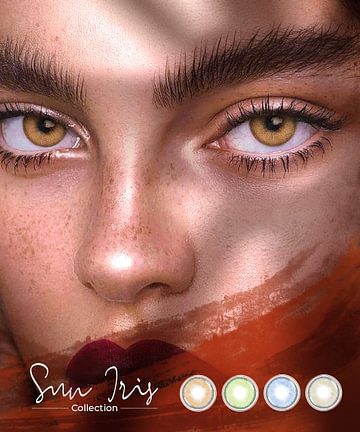
Cosas que debes saber al comprar lentes de contacto de color por primera vez
Publicado por
Amy@Unicornsbeauty
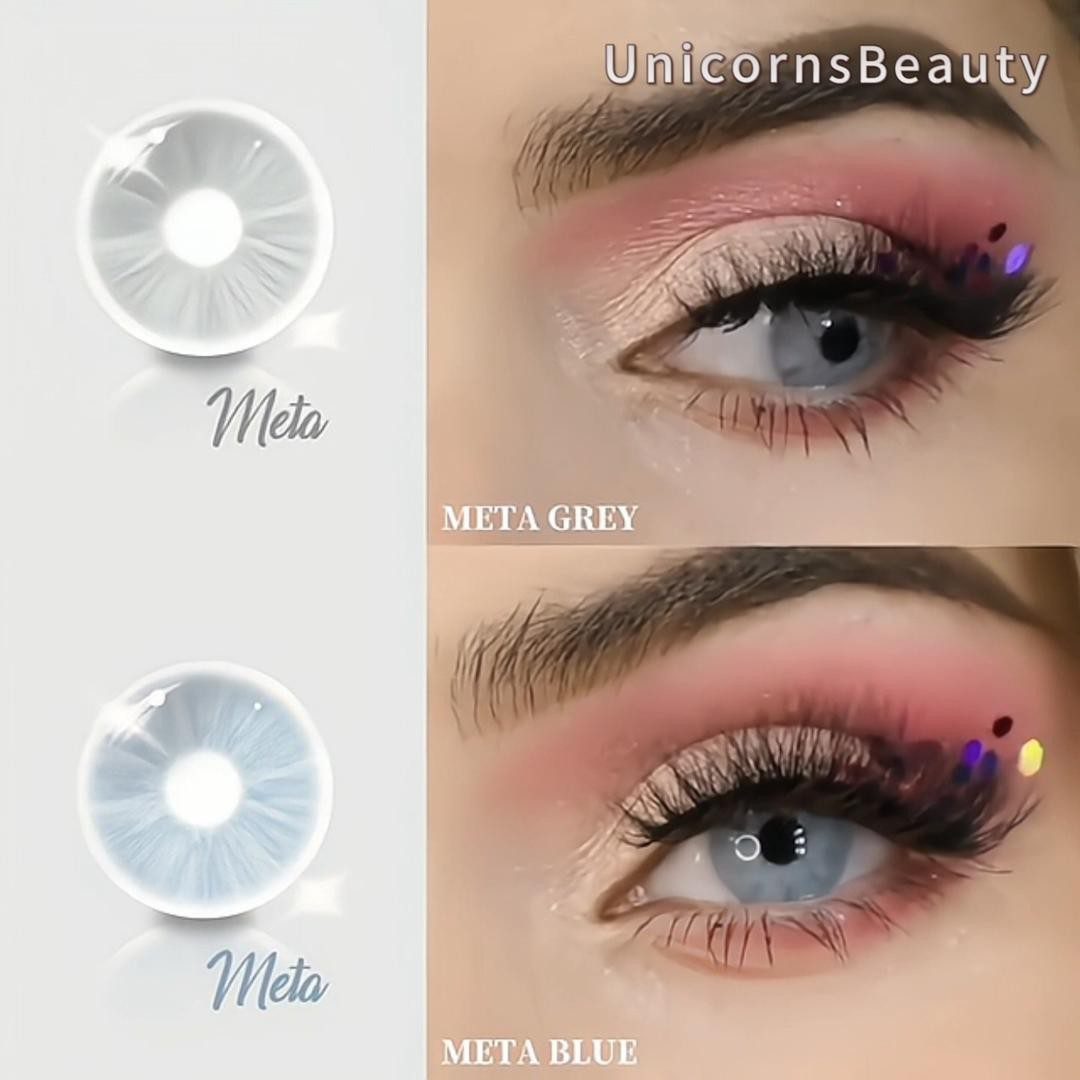
Choosing colored contact lenses requires careful consideration. It’s not just about selecting a color that looks good. Both reputable and untrustworthy products can also be found in the colored contact lens industry. Without basic discernment, it’s easy to end up with counterfeit and inferior lenses.
Many people experience issues such as dry eyes, eye irritation, lens slipping, and even inflammation when wearing contact lenses. These problems often arise from improper selection and poor hygiene practices. In particular, using unqualified or low-quality lenses, as well as incorrect usage, can have a detrimental impact on the health of our corneas. Without proper solutions, these issues can result in irreversible damage.
When it comes to selecting colored contact lenses, making the right choice is crucial for both style and eye health. With numerous options available in the market, it can be overwhelming to determine which brand to trust. In this article, we will guide you through the process of brand selection, focusing on sales qualifications, manufacturer and supplier credibility, as well as providing insights on color and style options. Additionally, we will emphasize the importance of good wearing habits to ensure your eyes stay healthy and vibrant. Let’s dive in!
The selection about the Water Content for Colored Contact Lenses
The choice of water content is crucial when it comes to colored contact lenses. Besides aesthetics, I prioritize the moisture level because coloured contact lens that lack sufficient moisture can greatly affect our comfort throughout the day. However, It’s not that higher water content in colored contact lenses is better. This is a point that many people easily confuse.
In theory, lenses with higher water content are softer and more breathable, providing an initial experience of great moisture. However, we shouldn’t blindly pursue lenses with high water content because there are lots of factors needed consideration. When making a choice, it’s essential to consider whether your eyes tend to get dry naturally or if you’re living in a dry environment.
For those ordinary people, water content of 50% or higher is suitable. Such lenses are relatively softer and have better oxygen permeability. This is especially beneficial for beginners as it reduces the foreign body sensation during initial wear and increases comfort. These lenses often incorporate moisturizing ingredients like hyaluronic acid or other moisture-locking technologies to prevent excessive absorption of tears, which can result in dryness.
However, if your eyes are naturally dry or if you’re living in a dry environment or you have to wear lenses for a long time, lenses with water content below 50% are more suitable.
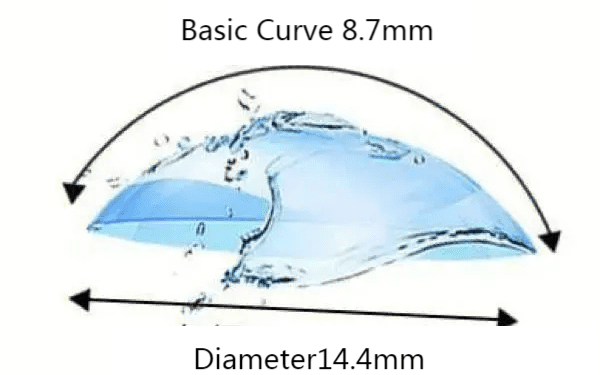
The Selection of Base Curve (BC) for Colored Contact Lenses
When it comes to the choice of colored contact lenses, a pivotal factor that directly affects comfort and wearing experience is the selection of the base curve (BC). The base curve pertains to the curvature of the lenses, and finding the appropriate equilibrium is vital to ensure a snug fit and prevent the lenses from slipping off the eyeball.
Opting for a larger base curve may entail disadvantages concerning the fit of colored contact lenses. It could result in lenses that fail to fit closely to the eyeball, thereby increasing the likelihood of slippage. Conversely, a smaller base curve can induce a tight and uncomfortable sensation in the eyes. Discovering the optimal balance becomes imperative, ensuring utmost comfort without compromising lens stability.
To circumvent the inconvenience and discomfort caused by colored contact lenses slipping off the eyeballs, it is highly recommended to have your base curve value (BC) measured at an eyewear store before making a purchase. This professional assessment guarantees a more precise fit tailored to the unique shape of your eyes. However, if visiting a physical store is unfeasible, there are readily available options in the market that serve as a suitable starting point. Opting for a base curve within the range of 8.5mm to 8.6mm is widely accepted and suitable for the majority. Unless you possess particularly distinctive eyeball characteristics, this base curve generally ensures a comfortable and secure fit for your colored contact lenses.
The Significance of Diameter in Colored Contact Lenses Selection
Shifting our attention to another critical aspect of colored contact lenses selection, let us explore the significance of considering the diameter of the lenses. Many individuals, particularly women, aspire to have bright and captivating eyes, which leads them to seek out large-diameter contact lenses. However, it is crucial to strike a balance between aesthetics and suitability
In reality, most people find contact lenses with a diameter ranging from 14.0mm to 14.2mm more appropriate for their eyes. This diameter range allows for a natural enhancement of the eye’s appearance while preserving comfort. More specifically, a diameter of 14.1mm to 14.2mm is generally applicable and favored by many. For those with slightly larger eyes, a diameter of 14.5mm should be sufficient to achieve the desired effect.
When selecting the ideal colored contact lenses, it is crucial to consider both the base curve and the diameter. Finding the perfect harmony between these two factors is essential for optimal comfort, stability, and aesthetic appeal. By choosing lenses with the appropriate base curve and diameter, you can ensure that your eyes appear bright, remarkable, and captivating.
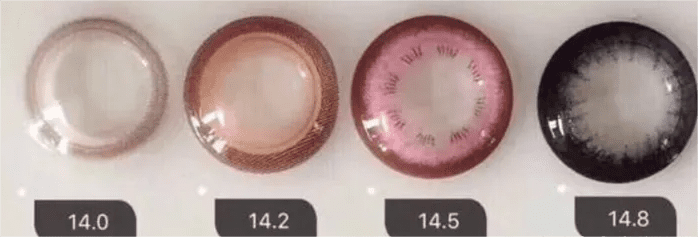
Material Selection: Unraveling the Advantages and Discrepancies
When it comes to the realm of contact lenses, the meticulous selection of materials assumes a paramount role in ensuring utmost comfort, visual acuity, and overall ocular well-being. There are two materials commonly encountered in the market, namely hydrogel (including its ion and non-ion variants) and silicone hydrogel.
- Hydrogel Material:
Hydrogel lenses have traversed the annals of time as one of the pioneering and widely embraced materials for contact lenses. Among the hallmark merits of hydrogel lies its unparalleled softness, endowing wearers with a tender and blissful experience. These lenses exude a remarkable degree of elasticity, enabling them to mold themselves to the contours of the eye, rendering a snug and tailored fit. Furthermore, hydrogel lenses boast a substantial moisture content, bestowing a shield against the perils of dryness and ensuring an incessant supply of hydration for the precious orbs. Additionally, their slender configuration adds an extra layer of comfort to the overall wearing encounter. However, it is imperative to acknowledge that the oxygen permeability of hydrogel lenses primarily hinges upon the aqueous content present within the material. Consequently, their capacity for oxygen transmission falls slightly short in comparison to that of silicone hydrogel lenses.
- Ion Material:
The realm of ion material signifies a lofty echelon within the realm of hydrogel, striking a harmonious equilibrium between oxygen permeability and moisture content, thus rendering it a superlative choice for devotees of contact lenses. The augmented moisture content inherent in ion material lenses substantially mitigates the likelihood of desiccation and associated discomfort. Moreover, these lenses achieve an oxygen permeability that adheres to exacting international standards, thereby guaranteeing an optimal supply of oxygen to the ocular realm, thereby preserving health and fostering well-being. The amalgamation of enhanced moisture retention and efficacious oxygen transmission bestows upon ion material lenses a steadfast and comfortable option for prolonged use.
- Non-Ion Material:
Within the echelons of high-quality hydrogel lenses resides the non-ion material, boasting a distinctive attribute of curtailing protein deposition. This characteristic renders it particularly well-suited for individuals with an elevated secretion of proteins within the tear layer. By diminishing protein accretion, non-ion material lenses is good for perpetuating lucid vision and mitigating the perils of discomfort or irritation arising from protein buildup. The compatibility of non-ion material with protein-rich tears makes it an ideal recourse for individuals with specific tear composition peculiarities.
- Silicone Hydrogel:
The advent of silicone hydrogel lenses heralds a paradigm shift in the domain of contact lens materials. These lenses embody a unique dual-channel structure, characterized by the amalgamation of water and silicone constituents. The silicone component takes center stage in facilitating the conveyance of oxygen to the cornea, thereby endowing these lenses with exceptional oxygen permeability. By affording an augmented supply of oxygen to the eyes, silicone hydrogel lenses lend support to the respiration of the cornea, thereby fostering ocular vitality. Additionally, these lenses exhibit minimal protein deposition, curtailing the likelihood of discomfort arising from protein accumulation. Nevertheless, it is imperative to note that, owing to the presence of silicone, silicone hydrogel lenses tend to manifest a slight firmness when juxtaposed with their hydrogel counterparts. Furthermore, the existing technological limitations preclude the production of multi-layered colored cosmetic lenses utilizing silicone hydrogel material.
Brand Selection: How to Choose the Right Colored Contact Lenses
(1) Look at the Sales Qualifications:
Colored contact lenses fall under the category of Class III medical devices, requiring a Medical Device Operating License for legitimate operation. Any individual or business involved in selling colored contact lenses without proper authorization is engaged in illegal activities. Moreover, an Enterprise Business License is also essential for conducting business operations. Online stores dealing with colored contact lenses should possess an Internet Drug Information Service Qualification Certificate. These qualifications ensure that the lenses meet regulatory standards and are sold through legal channels, promoting safety and trust.
(2) Look at the Manufacturer and Supplier:
Selecting branded colored contact lenses that have a Medical Device Registration Certificate is of utmost importance. This certificate signifies that the National Medical Products Administration of each country has approved the product, significantly reducing the risk of purchasing counterfeit or substandard lenses. Gathering information about the manufacturer of the brand can further enhance your decision-making process. Since many colored contact lenses are manufactured through OEM production, it is crucial to identify reputable manufacturers. Brands that provide guarantees right from the source of production offer added assurance, ensuring the lenses’ safety and quality.
Color and Style Selection: Finding Your Perfect Look
Amidst the extensive assortment of contact lenses accessible to consumers, Unicorn has emerged as a highly favored brand among individuals aspiring to enhance the aesthetics of their eyes. Here is the exploration of the diverse color options proffered by Unicorn, and the distinctive attributes they bestow upon your ocular faculties:
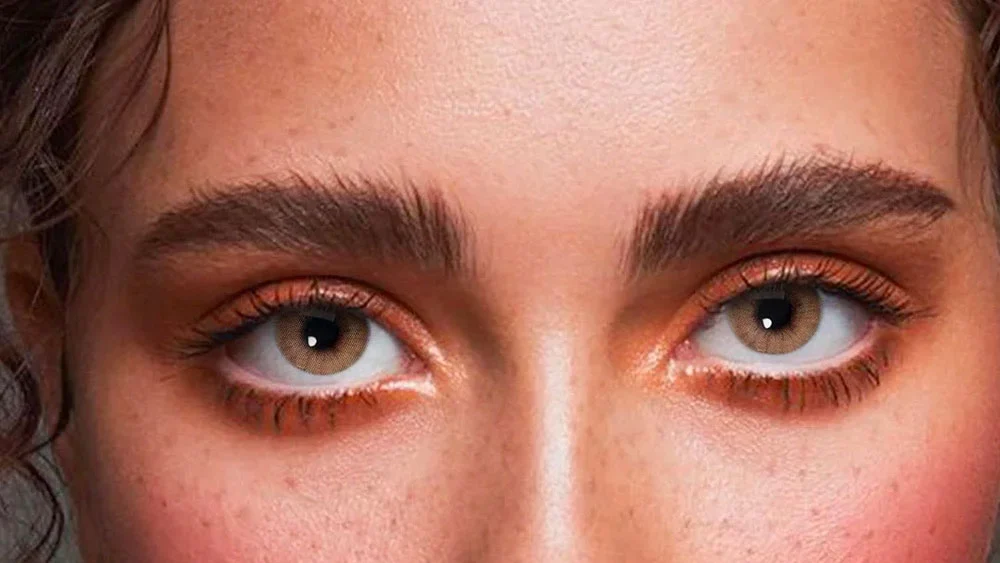
- Lentes de contacto marrones: The brown collection of contact lenses bestows a natural and ethereal countenance, instantly augmenting the perception of larger and more captivating eyes. These lenses possess the extraordinary capacity to invigorate your overall visage, even when minimal eye embellishment is employed. By adorning the brown lenses, you can attain a rejuvenated and revitalized semblance. The elegance exuded by these lenses imparts a touch of innate exquisiteness to your ocular orbs, thereby enhancing their irresistible allure.

- Lentes de contacto azules: Opting for the azure lenses evokes a mesmerizing mist-like effect, endowing your eyes with a rounded and resplendent demeanor. When these lenses are enshrouded upon your natural iris, they effortlessly assimilate, conjuring a captivating allure that ensnares attention. The natural sky-blue hue inherent in these lenses possesses the capability to illuminate your eyes, suffusing them with a genuine sense of inherent warmth. By electing to embrace the blue contact lenses, you radiate an aura of enchantment and grace.
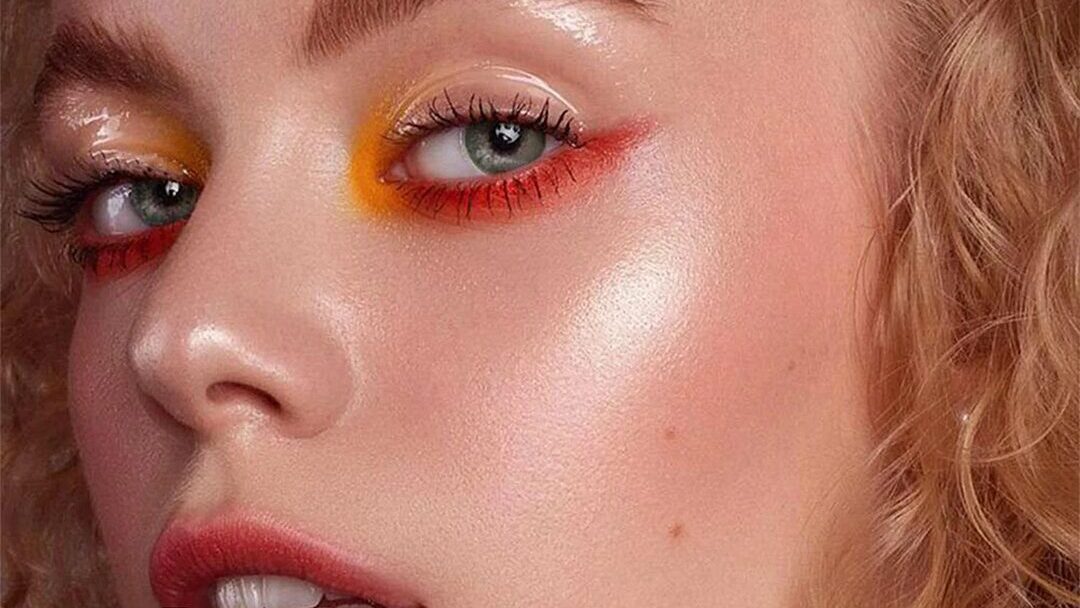
- Lentes de contacto verdes: For those who aspire to manifest an unparalleled and eye-catching appearance, the velvety verdant lenses stand as an impeccable choice. These lenses manifest a shimmering quality reminiscent of a captivating cat’s eye gemstone, thereby emanating an alluring and enigmatic charm. Possessing a subtly saturated green shade, these lenses render your eyes transparent and glossy, effectuating a mesmerizing visual spectacle. When harmoniously paired with suitable eye embellishments, the green lenses catapult you into the limelight within selfies and group photographs, etching an indelible impression upon all who are privy to your entrancing gaze.
By embarking upon an exploration of the multifaceted color options presented by Unicorn contact lenses, you embark upon a quest to discover the ideal match that elevates the allure of your eyes and overall countenance. Whether you yearn to embody a natural and soft aesthetic with the brown lenses, a misty and alluring charm with the blue lenses, or a distinctive and captivating allure with the green lenses, Unicorn proudly furnishes an array of choices meticulously designed to cater to your individual style and preferences. Elevate your ocular prowess and make a resounding statement with the resplendent offerings bestowed by Unicorn contact lenses.
Good Wearing Habits: Protecting Your Eyes
Developing commendable habits when it comes to wearing contact lenses plays a vital role in safeguarding your eye health and extending the lifespan of your lenses. Here are some indispensable recommendations to adhere to:
- Examine the lenses with utmost care: Prior to wearing contact lenses, it is imperative to conduct a thorough examination to ensure they remain unscathed and in optimal condition. Diligently scrutinize the lenses for any discernible signs of damage, such as tears, cracks, or distortions. Even the most minuscule imperfections can induce discomfort or pose potential harm to your eyes. Therefore, it is of utmost importance to be meticulous in your evaluation.
- Ensure impeccable cleanliness: Verify that the lenses are pristine and devoid of any debris or foreign particles. In the event you observe any dirt or residue adhering to the lenses, cleanse them using the prescribed solution and the appropriate storage case. Concurrently, always ascertain the expiry date indicated on the packaging and abstain from utilizing lenses that have exceeded their expiration date.
- For individuals using non-daily disposable contact lenses: it becomes imperative to immerse them in lens solution for a duration of 8-12 hours after opening the package. Unlike daily disposable lenses, these lenses necessitate meticulous cleansing and disinfection prior to donning them. The packaging of long-term use lenses typically contains saline solution, which, if the lenses come into direct contact with the eyes, may lead to irritation. Soaking the lenses in lens solution serves the purpose of eliminating any dirt, debris, or protein deposits that might have accumulated on the lenses. This cleansing process guarantees that the lenses remain free from potentially harmful substances capable of causing eye irritation or impairing vision.
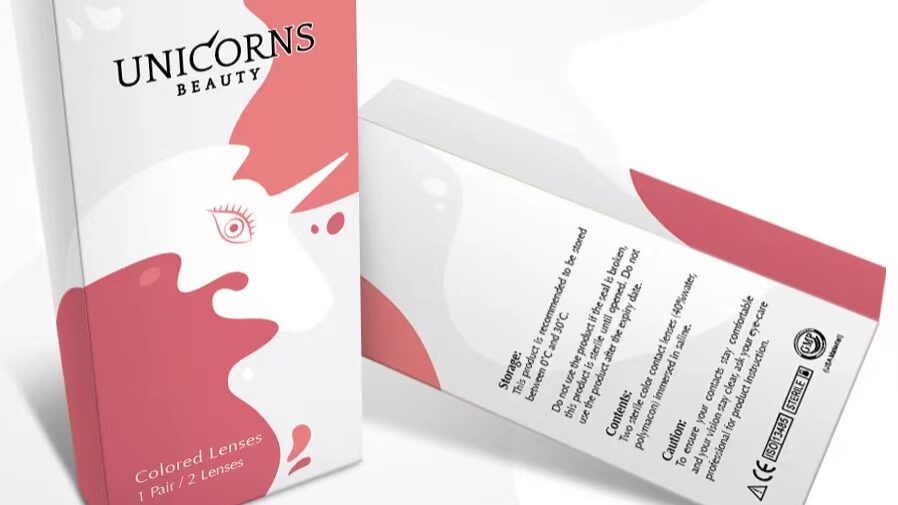
- Timely replacement: It is generally advisable to substitute contact lenses every 4-5 months, although the precise replacement schedule might vary based on the type of lenses and the recommendations provided by your eye care professional. Over time, contact lenses tend to accumulate deposits, resulting in reduced comfort and an increased risk of bacterial proliferation. By adhering to the recommended replacement timetable, you can mitigate these risks and ensure the maintenance of optimal eye health.
- Avoid prolonged usage: Prolonged wearing of contact lenses beyond the prescribed replacement period can lead to a myriad of issues. The lenses become more susceptible to damage, including tears or scratches, thereby compromising their efficacy and potentially endangering ocular well-being.
- Meticulous cleansing: In addition to timely replacement, meticulous cleaning of contact lenses is indispensable for preserving eye health. Failure to properly cleanse the lenses can contribute to the buildup of deposits, debris, and bacteria, culminating in discomfort, blurred vision, and the potential for infections. Adhere to the recommended cleaning procedures outlined by your eye care professional and employ the designated cleaning solutions to ensure effective lens hygiene.
- Maintain consistent hygiene practices: Alongside lens cleansing, upholding exemplary hygiene practices while handling and wearing contact lenses is of paramount importance. Always thoroughly wash your hands before coming into contact with the lenses, refrain from using saliva or water for moistening or cleansing purposes, and store the lenses in a clean and suitable storage case. By adhering to these hygiene protocols, you minimize the risk of introducing harmful substances or bacteria to your eyes.
Buying colored contact lenses for the first time requires informed decision-making to ensure both style and eye health. By understanding the risks of improper selection, choosing trustworthy brands and suppliers, exploring color and style options, and maintaining good wearing habits, you can enjoy the transformative effect of colored contact lenses while prioritizing the well-being of your eyes. Make your choices wisely and embark on your journey to vibrant and stylish eyes


 Oro
Oro